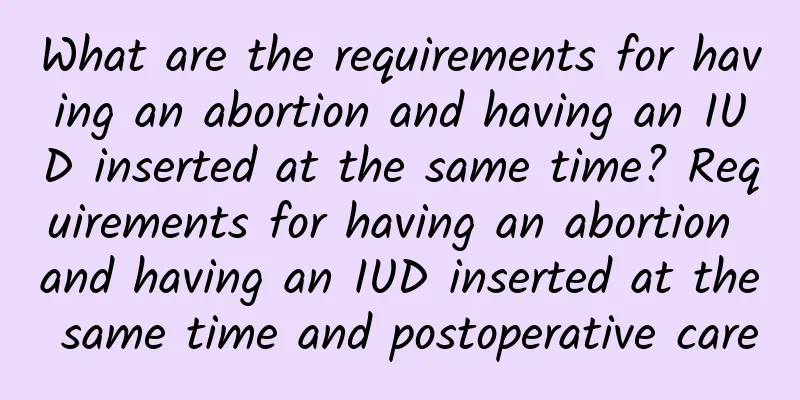What are the requirements for having an abortion and having an IUD inserted at the same time? Requirements for having an abortion and having an IUD inserted at the same time and postoperative care

|
It is medically possible to have an abortion and an IUD at the same time, but it must meet certain requirements. If the requirements are not met, the IUD cannot be inserted. It must be performed after the abortion. So what are the requirements for having an abortion and an IUD at the same time? What kind of postoperative care should the patient do after the IUD is inserted? Let's learn about the requirements and postoperative care for having an abortion and an IUD at the same time. I hope that through my explanation, everyone can understand it. First, you have to go to a regular hospital, because such hospitals will make a comprehensive judgment based on the patient's actual hospital condition, and the surgical sterilization measures are good, and the chance of surgical infection is small. Second, it depends on the gestational age at the time of surgery, because a smaller uterus will contract better after surgery and the insertion of an IUD will not cause bleeding; while a larger gestational age will cause the uterus to contract poorly after surgery and is prone to bleeding and infection. Third, we need to see how the uterus contracts after the abortion. If the uterus contracts well, the IUD can be inserted. If the uterus contracts poorly, the IUD cannot be inserted, and we must take good measures to prevent infection after the operation. If all three of the above conditions are met, it is possible to have a painless abortion and an IUD insertion at the same time. If not, the best time to have an IUD insertion is one month after the abortion, when normal menstruation resumes, and within 3-7 days after the menstruation is clean and there is no blood. The following situations are not suitable for immediate IUD insertion: 1. Those who have poor uterine contraction, heavy bleeding, and repeated vaginal bleeding before the operation may have residual pregnancy tissue or infection; 2. Postoperative examination of the aspirate is suspicious, such as benign or malignant hydatidiform mole; severe cervical erosion or genital tumors; 3. Malformations of reproductive organs, such as double uterus, bicornuate uterus, etc.; 4. Patients with various serious systemic acute and chronic diseases, such as severe anemia, blood diseases and acute stages of various diseases, please follow the guidance of experts for specific circumstances. Things to note after having the IUD inserted: 1. Pay attention to hygiene and avoid infection: After the ring is inserted, the vulva should be washed every day to keep it clean. 2. Get adequate rest and avoid heavy physical labor: Generally, you should rest for 1-2 days after the ring is placed. Do not do heavy physical labor within a week to avoid causing the ring to fall off and bleeding. 3. Regular check-ups: Generally, the first check-up after the placement of the ring is after the first menstruation, the second check-up is within 3-6 months after the placement of the ring, and the third check-up is a review 12 months after the placement of the ring, and then a review once a year. 4. Pay attention to vaginal bleeding and ring shedding: If you find that the vaginal bleeding is heavy, more than double the normal menstrual blood volume or the bleeding time is long, and the menstrual cycle changes are obvious, you should go for a check-up in time. In the first 3 months, you should also pay attention to whether the ring has fallen off. After an abortion and an IUD are inserted, the body is more susceptible to infection. During this operation, you must pay attention to disinfection. Therefore, when choosing an abortion hospital, patients must choose a local regular hospital to prevent infection after the operation and are more likely to suffer from gynecological diseases. After the abortion, patients need to do postoperative care to help the body recover. |
>>: Does cervicitis affect pregnancy? Revealing the impact of cervicitis on pregnancy preparation
Recommend
Reject Cai Cai's expression! 3 types of weight loss acupoints should be pressed correctly
Modern people overeat and lack exercise, and are ...
What medicine should elderly people take for uterine fibroids? Clinical manifestations of uterine fibroids in the elderly
What medicine should elderly people take for uter...
What are the symptoms of endometrial tuberculosis?
Endometrial tuberculosis is a common gynecologica...
Do you still dare to do this? - The risks of abortion
Artificial abortion is often a measure taken by w...
What is the nursing method for moderate cervical erosion?
Moderate cervical erosion is also a type of cervi...
Experts introduce the inspection before abortion that cannot be ignored
Abortion is very harmful to women. If there is an...
What to eat during pregnancy with multiple uterine fibroids? Diet for multiple uterine fibroids during pregnancy
What to eat during pregnancy with multiple uterin...
Women should pay attention to various menstrual irregularities after induced abortion
The causes of irregular menstruation are mostly o...
You can't afford it! Hidden dangers of fat in diet
Your baby always stuffs snacks into his mouth one...
Why is bacterial vaginosis difficult to cure in unmarried women?
It is indeed a bit difficult to treat this diseas...
Key points for diagnosis of uterine fibroids
Uterine fibroids refer to benign tumors that occu...
Why do uterine fibroids sometimes disappear? Why do uterine fibroids sometimes disappear?
Why do uterine fibroids sometimes not In recent y...
Let's learn about the hazards of severe cervical erosion
"What are the hazards of severe cervical ero...
Correct understanding of cervical erosion
Among women with active sex lives, the incidence ...
Can female Bartholinitis really be cured?
Bartholinitis is a disease that women are prone t...









